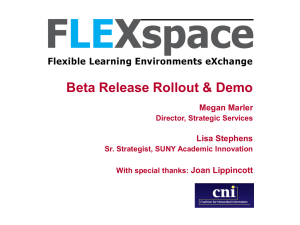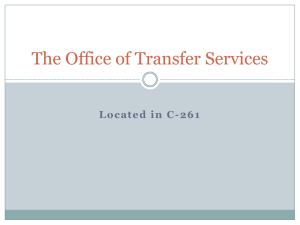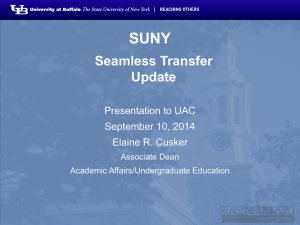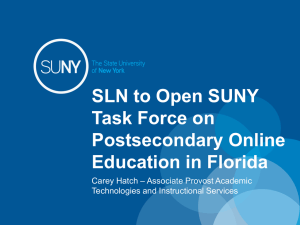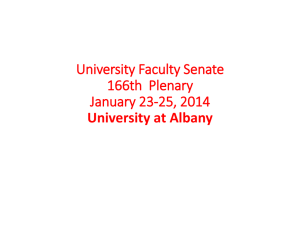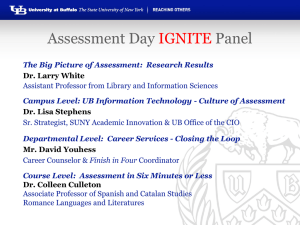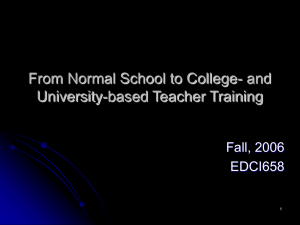PowerPoint Presentation - Faculty Council of Community Colleges
advertisement
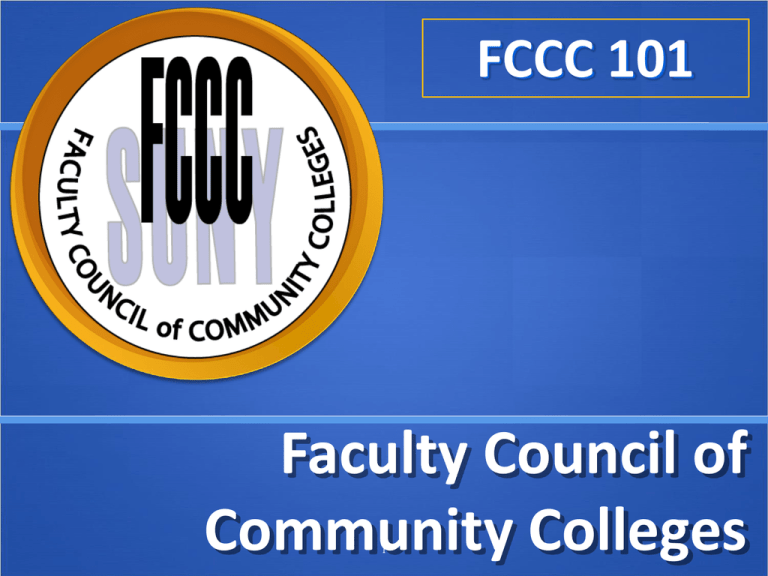
FCCC 101 Faculty Council of Community Colleges 1 FCCC Purpose The official agency through which the SUNY community college faculty engages in the governance of the University. Source: FCCC Bylaws 2 FCCC History The Faculty Council of Community colleges was conceived by Dr. Sebastian Martarana, the University Dean for Two-Year Colleges Spring 1966 – The University Council of Presidents of the Public Community Colleges passed a resolution calling for the establishment of a Faculty Council. 3 FCCC History Spring 1966 - The University Faculty Senate passed the following resolution: The Senate recommends to the Administration of SUNY the formation of a Community College Faculty Council composed of representatives elected by each community college faculty. This council should be constituted as the official governing body of these faculties, with a mandate to study, consult, and advise on system-wide matters relating to faculty and educational problems, policies and programs. Fall 1966 — Faculty representatives from 20 of the 24 community colleges met to create the Community College Faculty Council Articles of Organization 4 FCCC History Spring 1967 SUNY Board of Trustees approved the creation of the Faculty Council of Community Colleges The FCCC Articles of Organization (Part 606) were included in New York State Education Law First regular meeting of the FCCC was held May 12, 1967 in Albany where the first officers were elected Topics discussed at this first meeting included: Problems confronting community colleges Teaching loads Academic Freedom Expenses of the Council 5 FCCC History Delegates from New York City community colleges were active in the organization until 1975, when CUNY community colleges were severed from SUNY July 2011 – President of Faculty Council of Community Colleges becomes non-voting member of the SUNY Board of Trustees 6 FCCC Structure Membership The voting members of the Faculty Council shall include one faculty delegate or alternate from each community college and the President of the Faculty Council. The faculty of each community college shall elect a delegate and an alternate in a manner they may establish by local faculty bylaws. Source: FCCC Bylaws 7 FCCC Structure President Vice-President Secretary Treasurer Past President Information Officer Press Officer Committee Chairs 8 FCCC Structure The Council is organized into five committees Academic and Student Affairs Governance Awards Communication and Professional Development Education Initiatives 9 Statewide Shared Governance SUNY System Administration SUNY Board of Trustees New York Community College Association of Presidents (NYCCAP) New York Community College Trustees (NYCCT) Community College Business Officers Association (CCBOA) Chief Academic Officers Association SUNY University Faculty Senate (UFS) CUNY University Faculty Senate (UFS) SUNY Student Assembly (SA) Individual Campus Governance Leaders 10 Statewide Shared Governance PLUS New York Community College Association of Presidents (NYCCAP) New York Community College Trustees (NYCCT) Community College Business Officers Association (CCBOA) Chief Academic Officers Association CUNY University Faculty Senate (UFS) Individual Campus Governance Leaders SUNY System Administration SUNY Student Assembly SUNY University Faculty Senate SUNY Board of Trustees Faculty Council of Community Colleges 11 What the FCCC Does Communicate positions to SUNY Administration through Resolutions Research issues of concern to community college faculty Provide guidance to faculty, SUNY Administration, and other constituencies on various issues through white papers, position statements, etc. Provide forums for discussion among faculty, SUNY Administration and other constituencies Advocate for community colleges and their students with governmental policy makers and others 12 FCCC Commitments Community Colleges as Democracy’s Colleges Academic Excellence Academic Freedom Shared Governance 13 Fundamental FCCC Positions Shared Governance Faculty are best qualified and should therefore have a primary role, through a sound and well-established governance structure, in the formulation of policy relating to: Curriculum Methods of Instruction Academic Standards Academic Student Affairs Program Development Degree Requirements 14 Fundamental FCCC Positions Shared Governance Legitimate shared governance processes involve the participation of faculty selected through established and transparent campus governance procedures to represent their constituencies. 15 FCCC Fundamental Positions Academic Freedom Academic freedom is the indispensable condition for the faculty to carry out its work: the responsibilities of teaching, research and publication, and of participating in college governance in order to advance human knowledge. It is one of the cornerstones of a sustainable democracy. 16 Fundamental FCCC Positions Academic Freedom “The responsibility of the university as a whole is to the community at large, and any restriction upon the freedom of the instructor is bound to react injuriously upon the efficiency and the morale of the institution, and therefore ultimately upon the interests of the community.” Source: American Association of University Professors (AAUP) 17 Fundamental FCCC Positions Assessment Sound assessment practices are best developed locally by the faculty and should be used to improve teaching and learning. 18 Fundamental FCCC Positions Student Mobility Students within SUNY should be able to transfer their coursework seamlessly and system wide without undue complications 19 The Faculty Council of Community Colleges We work hard to make a difference and in the process we establish friendships and professional relationships with faculty from across 20 the state.

